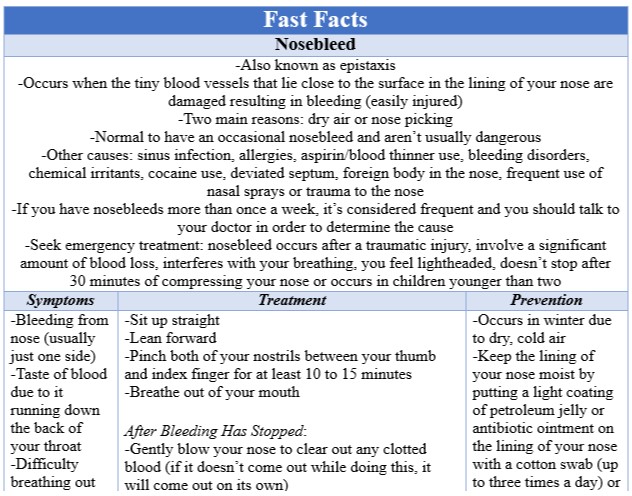What’s going on with your nose?
You’re sitting at home watching your favorite TV show while having a snack when the next thing you know, you feel a warm trickle coming out of your nose running down your face. You go to brush it away with your hand and notice that it is blood. You get a tissue, pinch your nose and after a few minutes, it stops. Why did this happen? Is it serious? What can you do to prevent it from happening again?
 Definition
Definition
Nosebleed, or epistaxis, occurs when the tiny blood vessels that lie close to the surface in the lining of your nose are damaged resulting in bleeding. They are easily injured. The two main reasons a nosebleed occurs is due to dry air or nose picking. It’s normal to have an occasional nosebleed and aren’t usually considered to be dangerous. Some other causes of a nosebleed are sinus infection, allergies, aspirin/blood thinner use, bleeding disorders, chemical irritants, cocaine use, deviated septum, foreign body in the nose, frequent use of nasal sprays or trauma to the nose. Some less common causes of nosebleeds include alcohol use, leukemia, nasal polyps, pregnancy, nasal/paranasal tumors, and nasal surgery. If you have nosebleeds more than once a week, it’s considered frequent and you should talk to your doctor in order to determine the cause. Seek emergency treatment if your nosebleed occurs after a traumatic injury, involves a significant amount of blood loss, interferes with your breathing, you feel lightheaded, it doesn’t stop after 30 minutes of compressing your nose or occurs in children younger than two.
Treatment
When treating a nosebleed, it is essential that you sit up straight and lean forward because this helps to reduce the pressure in the veins of your nose and prevents you from swallowing the blood. Make sure to pinch both of your nostrils between your thumb and index finger for at least 10 to 15 minutes because this puts pressure on the area that is bleeding by compressing it against your nasal septum (middle part of your nose that is separates your two nostrils). While you are pinching your nose, be sure to breathe out of your mouth.
When you are sure that the bleeding has stopped, gently blow your nose to clear out any clotted blood, so you’ll be able to breathe. If the clot doesn’t come out, don’t blow hard or this can cause the bleeding to start again. Instead, leave the clot in place and it will come out on its own. Don’t bend down for a few hours because this increases the pressure in your nose. If you have a spray nasal decongestant, it can be helpful to use it because they usually constrict the blood vessels of your nose.
If the bleeding doesn’t stop, it might be coming from somewhere further in your nostril than you can reach and needs to be treated by a doctor. Your doctor can cauterize (burn) the blood vessel to get it to stop bleeding by using a small electric current, silver nitrate stick or laser. Sometimes, your doctor will pack the affected nostril with special gauze or an inflatable balloon, which puts pressure on the blood vessel (similar to when you pinch your nose, but it can reach further into your nostril).
Prevention
Most people experience nosebleeds in the winter due to the dry, cold air. To prevent them, you can put a light coating of petroleum jelly or antibiotic ointment on the lining of your nose with a cotton swab to keep it moist. You can do this up to three times a day. Another option is to use saline nasal sprays to help keep your nasal passages from drying out. Using a humidifier to add moisture to the air in your home is also beneficial. Also, it can be helpful to trim the fingernails of children. This way if they pick their nose, they don’t scratch the sensitive lining. If you use supplemental oxygen, you are at increased risk for nosebleeds because your nasal passages become dried out due to the flow of air through them. You can put water-based lubricants in your nostrils and increase the humidity in your house to help prevent this.
A nosebleed can come as a surprise, but rarely is it serious. If you have any questions or concerns, please speak with your doctor. If you would like more information, please visit the Medline Plus Nosebleed page at https://medlineplus.gov/ency/article/003106.htm